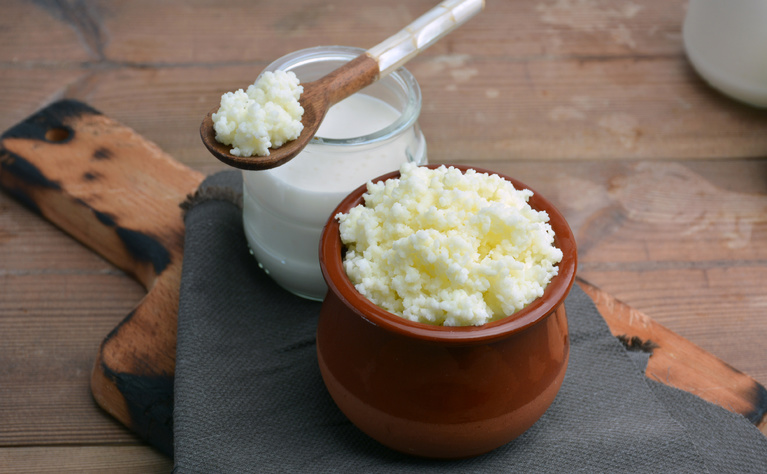
Kefir is a type of probiotic food - a food which contains live and active bacteria. In this article we take a look at what it is and if it has any benefits for IBD.
Kefir is a fermented probiotic drink/food. It is made using kefir 'grains’ and liquid which are fermented. There are two types of kefir - one is milk based, the other has a sweetened water base. Both are fermented. Kefir grains are formed of lactic acid bacteria and yeasts. Some of the common probiotic bacteria that can be found within kefir grains include: Lactobacillus acidophilus, Bifidobacterium bifidum, Streptococcus thermophilus, Lactobacillus delbrueckii subsp. bulgaricus, Lactobacillus helveticus, Lactobacillus kefiranofaciens, Lactococcus lactis, and Leuconostoc species.
Milk kefir has more live active bacteria strains than yogurt and also more bacteria in total (billions!).
You can make your own kefir at home. Use this recipe for milk kefir - you will need to buy milk kefir grains to make it.
Our digestive system forms one of the barriers between the outside world and our internal structures. Its role goes far beyond just digesting our food.
There has been a big shift over the last century in the way scientists are approaching the research of our digestive systems. In 1908 Elie Metchnikoff won a Nobel Prize for identifying a link between the digestive system and the immune system. His focus and theory depicted that by manipulating our intestinal microbiome with friendly bacteria, we could enhance our health (Mackowiak, 2013).
The turnover of bacteria in our guts is ongoing. Factors that can negatively affect our microbiome, making it imbalanced, include: the environment around us, stress, poor diet, certain medications, illness etc. This is known as ‘dysbiosis’, which was named by Elie Metchnikoff, mentioned earlier. It basically means, “not living together”. So, in other words, our microbiome isn’t working with us towards optimal health.
Read more about gut bacteria and our microbiome
Symptoms of dysbiosis can include:
People with inflammatory bowel disease (IBD) such as ulcerative colitis (UC) and Crohn's disease may suffer with many of these symptoms. This could be as a result of their IBD but it may also be as a result of dysbiosis or condition such as IBS. It is becoming increasingly accepted that intestinal dysbiosis (an imbalance of the gut microbiota) is found in people with IBD1, 2, 3. One small clinical trial in 2018 showed that taking kefir may help with these symptoms in people with Crohn’s Disease and may help to reduce inflammation4.
Kefir bacteria have shown to be able to colonise the intestinal tract and the yeasts within kefir (such as Saccharomyces kefir and Torula kefir) have shown to help control and eliminate destructive pathogenic yeasts in the body (Murray & Pizzorno, 2007). This can help create symbiosis again.
There are some tests, which you can do to determine the status of your gut. These include: a comprehensive stool analysis with parasitology; organic acid testing, which looks for candida and a bacterial overgrowth; and the hydrogen or methane breath test, which also looks for a bacterial overgrowth and can help to detect the part of the intestine that has the problem. Most of these tests are not offered on the NHS and would need to be done through a private clinic.
Milk-based kefir comes out slightly thicker than milk and you can use it in the same way you would use milk. You can drink it or add it to smoothies. You can also use it in place of buttermilk in recipes. Bear in mind, though, that cooking it will destroy the bacteria (although it will maintain some of its other nutritional benefits).
Water kefir is taken as a drink. It has a slightly sweet taste and can be flavoured with fruit and/or herbs.